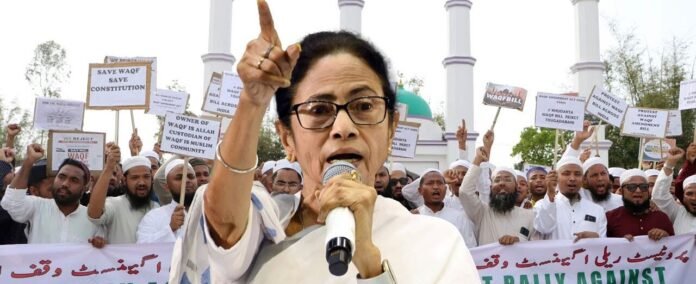West Bengal CM says Waqf law won’t apply in her state, blames centre for fueling unrest and division
West Bengal Chief Minister Mamata Banerjee has declared that the Waqf (Amendment) Act will not be implemented in the state, asserting her unwavering commitment to minority rights and accusing the Centre of stoking communal unrest. Her comments came during an address to the Jain community in Kolkata on Wednesday, following violent protests that rocked the Murshidabad district.
Banerjee said the legislation, recently passed in Parliament and signed into law by President Droupadi Murmu on April 5, was both poorly timed and politically charged. “I know you are aggrieved because of the enactment of the Waqf Act,” she told the gathering. “Have faith—nothing will happen in Bengal that allows anyone to divide and rule.”
Her remarks followed a day of unrest in Murshidabad, where demonstrators protesting the new law clashed with police. Stones were hurled, vehicles were torched, and the area bordering Bangladesh remained tense. Banerjee, without naming the BJP, warned against rushed legislation. “One shouldn’t do things hurriedly,” she said. “It creates difficulties. We already face challenges here—33 per cent of our population belongs to minority communities. Should we throw them out?”
The Waqf (Amendment) Act, which passed both houses of Parliament after extended debate, has been criticised by several opposition leaders and minority groups, who claim it centralises control over waqf properties and weakens community oversight.
Violence in Murshidabad escalated on Tuesday. Videos circulating on social media showed chaotic scenes as police struggled to contain large crowds. Leader of the Opposition in the Bengal Assembly, Suvendu Adhikari, was quick to blame the state government for the breakdown in law and order. He posted footage on social media platform X, accusing Banerjee of prioritising electoral gains over governance.
“Antisocial elements are taking to the streets, burning public property, and spreading chaos,” Adhikari wrote. “This is not dissent—it’s destruction. And the TMC government is allowing it to happen to protect their vote bank.”
Adhikari urged the Union Home Ministry and West Bengal’s Chief Secretary to intervene and deploy central forces in the district. He claimed the state police were either unable or unwilling to control the situation.
BJP IT cell head Amit Malviya also launched a scathing attack, accusing Banerjee of double standards. “When violence breaks out in other states, Mamata Banerjee is quick to cry foul and stage dramatic protests,” he wrote. “But when her vote bank runs riot in Murshidabad, she shuts down the internet to suppress the truth.”
The state government has not issued a formal response to the BJP’s criticism, but officials confirmed that temporary internet restrictions had been put in place to prevent the spread of misinformation.
Banerjee’s comments highlight a growing political divide as the Waqf legislation triggers polarised responses across India. Her declaration to defy the law places her on a collision course with the Centre and is likely to intensify political tensions ahead of upcoming state and national elections.
As the dust settles in Murshidabad, the future of the Waqf (Amendment) Act in West Bengal remains uncertain. But for now, Mamata Banerjee appears determined to resist its implementation—while the BJP continues to accuse her of playing communal politics to safeguard her electoral stronghold.
